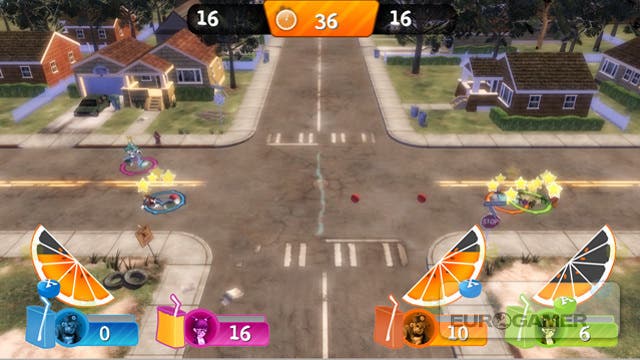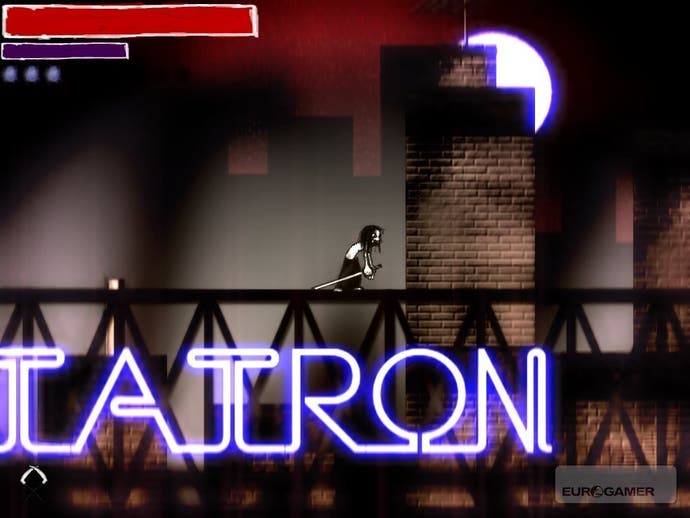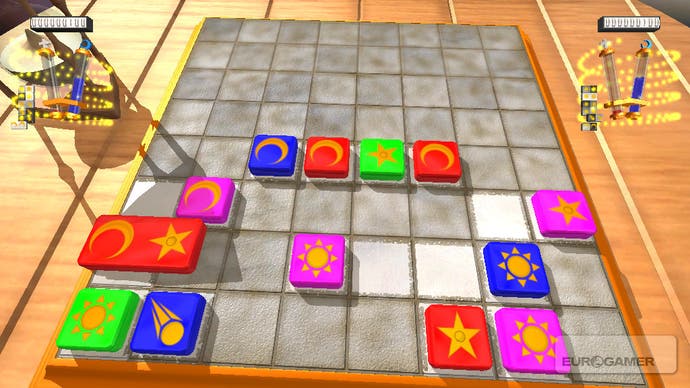GDC: XNA Trials Roundup
Culture, JellyCar, Little Gamers, ProximityHD, Rocketball, Dishwasher, TriLinea.
ProximityHD
- Developed by: Brian Cable, USA
Visually, this is unlikely to set any hearts pounding, but the core concept has the sort of simple genius that typifies a great puzzle game. Offline multiplayer only (at least in this demo form), you and up to three friends take it in turns to place randomly assigned numbers on a grid. If you place a higher number next to a rival, it turns to your colour. If your number is lower, you reduce their total by two. Place a number next to a piece of your own, and you boost its value by the same amount. When all the grid is filled, the player with the highest total wins. From that basic framework, Proximity extrapolates a satisfying strategic experience.
Is it better to go on the attack, and use your highest numbers to steal rival spaces? Or should you use low numbers to bolster your high-scoring tiles, making them harder to steal? Unfortunately, at the moment too much depends on the luck of the draw, meaning that it's possible for a player to stand very little chance of success. For most of one game, for instance, the first player received only one tile with a value higher than 10 while the second was regularly receiving 18, 19 and 20 score tiles. It may feel like a minimalist Catan or Carcasonne, but with a little more balancing and more pizzazz in the presentation, Proximity has the makings of a fine strategy game.
Rocketball
- Developed by: Fuel N' Spark Games

All I know about dodgeball I learned from Ben Stiller, but it's hard to see this overly busy update of America's most bully-friendly pastime turning into anything special. Two teams of two face off across an annoyingly narrow playing field, lobbing balls at each other, and using rocket power-ups for more powerful attacks. Get knocked over too many times and you have to do a quick burst of button-matching to get back on your feet.
Control is a little stiff, with the claustrophobic play area separated into two horizontal planes of action. You shuttle between these like table football, but have smoother movement left and right. You have to pick up balls by pressing A when standing over them, which feels rather clunky, and then throw it straight ahead or use it to block throws from the other team. It's all too manic, while the stiff controls mean that simply grabbing a ball and throwing it with any accuracy is a hassle rather than an intuitive gameplay component.
It's execution rather than concept that seems to be holding Rocketball back. With a larger play area, the ability to freely move around and automatically pick up balls, and more varied power-ups, this could be something fun. Right now, unfortunately, it isn't.
The Dishwasher
- Developed by: James Silva/Ska Studios

Certainly the most professional-looking game of the seven, The Dishwasher is another scrolling button-masher like Little Gamers. This time the tone is dark and nasty, as a humble dishwasher from the Foghorn Café awakes to discover his heart has been torn out and bad guys are out to get him. He grabs a pair of cleavers and sets off to slash everybody to pieces.
While the scratchy and gloomy comic-book style sometimes combines with the frenzied gameplay to leave you confused, there are enough compelling gameplay elements here to impress. Even in the first demo level you'll discover a fairly rich combo system, a hierarchy of power-ups and support items that can be purchased or earned, and a well executed boss battle.
The only major criticism that can be levelled is that the game doesn't really do much to disguise its debt to Alien Hominid, but that may well be a recommendation to some. Polished and balanced, this is the sort of game that could easily command an 800-Point asking price on Live Arcade.
TriLinea
- Developed by: Edison Prata, Brazil
A sometimes-bewildering mixture of Tetris, Puzzle Quest and dominos, TriLinea deserves praise for trying to find a new combination of well-known puzzle elements.

It's a competitive two-player game where you have a board and a procession of pieces to place. The pieces are like dominos, with two halves each bearing a colour and icon. Drop them on the board, form coloured lines of three horizontally or vertically, and do damage to the other player. The stroke of genius here is that there's no taking turns. You're each playing at the same time, on the same board. Keeping an eye on your opponent, stealing their lines and fouling up their plans is the order of the day.
To aid you in this respect, you can choose four spells to take into battle, each of which impacts the board in some beneficial or aggressive way. You can also trigger special events - tornadoes, meteor strikes and so on - by matching the icons as well as the colours. Some will almost certainly find it too fast-paced, as the game gives you little time to get your bearings. There's even a story mode - which is where the Puzzle Quest comparison comes in. While it can be a little crude graphically, it's clear that a lot of thought has gone into the gameplay and the result is a game with a lot of potential.
So, get downloading. It's not like you have to pay, and the more you play and talk about them online the more their creators will be able to adjust and learn from the experience.
